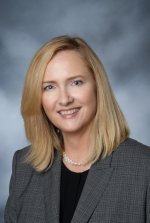Get to Know Robin Fleming

Meet Robin Fleming, Director of Nursing and Associate Teaching Professor in the School of Nursing & Health Studies. Dr. Fleming took the time to answer a few questions for us.
- Tell me about your work. What are you currently working on?
As an Associate Teaching Professor, I’m currently teaching a course in community health nursing, where Registered Nurses seeking their bachelor’s degree in nursing (BSN) work with community partners to learn about and apply public health principles to populations including the elderly, people who live unsheltered, incarcerated people, teens, people in need of reproductive health care, and even the State of Washington in developing rules for schools to update environmental health systems throughout our State’s public and private schools. As the Director of Nursing, I collaborate with my colleagues here at UWB, Tacoma, and Seattle to maintain excellence, equity, and opportunity for those seeking nursing careers to produce a world-class nursing workforce prepared to meet complex local and global health challenges.
- Of your accomplishments workwise, which are you most proud of and why?
This is like asking which of my children I prefer! I’ll name a couple: When I was working as a school nurse, I received a grant to create a public health education and career pathway program for immigrant students. I led this program in Seattle Public Schools at eight middle and high schools for two years. When I saw one of my students with a stethoscope around his neck while walking down the “Ave” in the U-District and he told me he was enrolled in nursing school, I was SO proud! I also started a peer health education program while working as a school nurse at Franklin High School in Seattle. I partnered with Planned Parenthood and Youth Suicide and Prevention Program to create student leaders who became school-wide experts on reproductive and mental health issues. This was a rare opportunity to grant access to low-income students to become health leaders in their school and beyond.
- Who inspired you to choose this field? Who inspires you now?
I was inspired by my children, my brother, and by a friend who lost his life due to AIDS. They inspired me to advocate for equity and to protect, provide for, and invest in children and families to ensure that every child has the supports needed to achieve optimum health, and equitable access to education and life opportunities. Today, I am inspired by the passion for learning that my students demonstrate, and by the faculty at UW Bothell who support each other, our students, and our collective mission to improve our region and beyond by producing students who think critically, work collaboratively, and act with integrity.
- What are your immediate plans for your work? What are your aspirations?
I’m revising a book on school nursing as a public health imperative, and am working on a manuscript on ways nurses intervene to disrupt the poverty-to-prison pipeline. I would also like to work with another state in replicating Washington State’s successful and unique School Nurse Corps program which creates a statewide infrastructure to ensure that school nursing services are available to all students. School nurses reduce health and educational inequities, increase student attendance, and improve graduation rates for underserved students.
- Why UW Bothell? As a member of the faculty, what would you tell other professors about working here? Besides their degree, what will students get out of attending UW Bothell?
As some have wisely said, it’s not what you do, but who you do it with that makes work inspiring and energizing. Faculty at UWB make me feel valued and supported. We all contribute different strengths and perspectives and mobilize them to enrich and support our collective work. The familial connection faculty share at UWB influences our teaching to create innovative and intellectually stimulating student experiences. Students at UWB will receive a degree, and will carry with them the respect, responsibility, pride, and collaboration that is modeled for them by faculty.
- How can students excel in your class?
This is pretty basic: Come to class, submit your work on time, demonstrate respect for – and an openness to learning from – your peers, and participate in class with a spirit of curiosity and respect for a diversity of opinions. And please communicate with me if you anticipate turning in assignments past the due date. I also recommend that students focus on building their writing skills and on fostering and strengthening group collaborations.
- How do you spend your time outside of work?
I spend time in the dance studio where I practice contemporary dance and ballet. I also enjoy tree bathing on the miles of trails in Shoreline with my Bullmastiff, Mr. Big, and watching Husky football games with my two sons. As a former journalist, I also enjoy occasionally writing articles for my local newspaper!
- What else would you like readers to know about you?
I was raised by a single mother and had a brother with Down Syndrome at a time when people with disabilities had no rights to education or services. From a young age, this made me feel an affinity with anyone who was discriminated against for any reason. This experience has been my strength: it serves me well in relating to and advocating for others who have had similar challenges.
